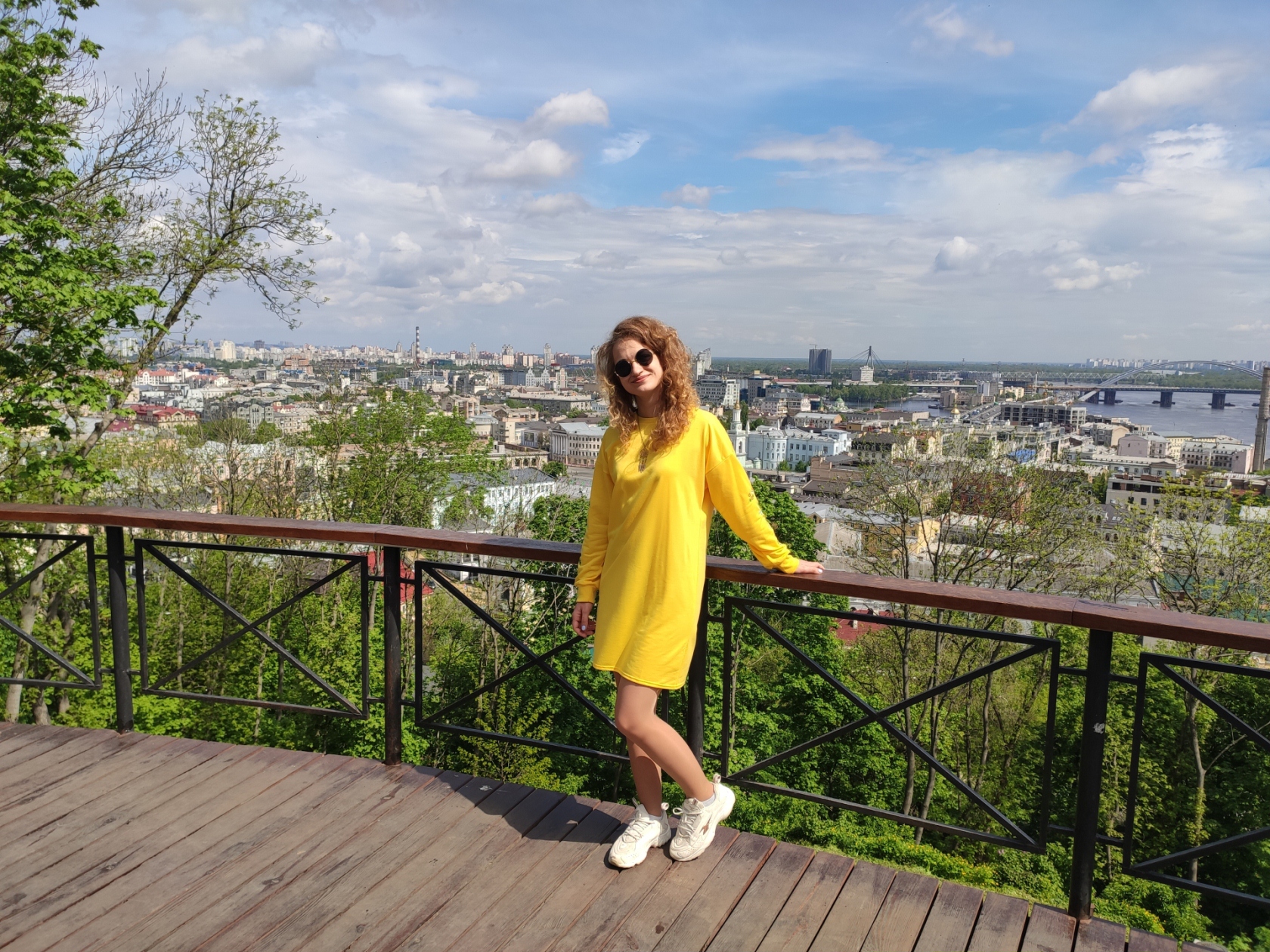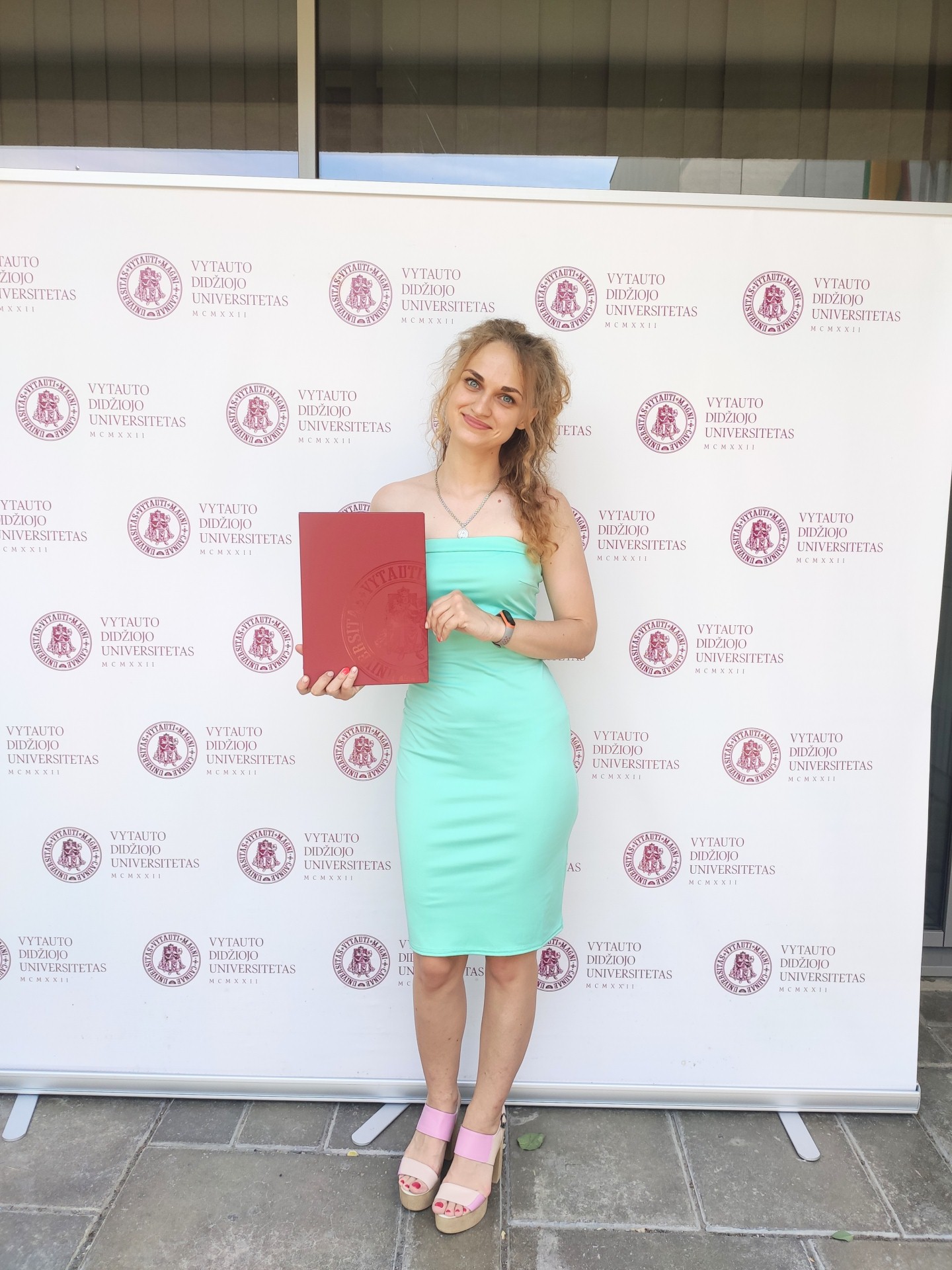VMU Graduate Anna Romanenko: Ukraine Will Win, It’s a Matter of Time

“Lithuanians are realists regarding Russia. All of this is already familiar to you: you have faced it as well, and you also fought for your independence and you have a very similar history. You feel it when you talk to any Lithuanians and you say: “I’m from Ukraine”. That’s all that is needed. Unfortunately, the Western world still sees Russia not as a threat, they think: “Everything will be alright. Conflict will end and we will live in the same world that we lived in before”. That is the biggest problem”, Anna Romanenko, Ukrainian graduate of Vytautas Magnus University (VMU), says. Currently, she is working at the non-profit association Global Lithuanian Leaders, where she is managing the Boycott Russia campaign.
Anna Romanenko has lived in Lithuania for eight years and has many compliments to our country for its active support of Ukraine. However, her homeland still needs help, awareness of the war needs to be raised, and international companies need to be pressured to leave Russia. In an interview with her, Anna discusses Russian mentality, the problem of the Western world not understanding Russia, and the similarities between Ukrainians and Lithuanians.
What are the activities related to Ukraine that you are currently involved in?
When the war started, I wanted to be useful to my country. I started volunteering at Red Cross in Kaunas, sorting clothes etc. But then I understood that many people are already doing that and my help is not really needed there. Then, somehow, I found a job position at Global Lithuanian Leaders. They were looking for a project manager of their new initiative, Boycott Russia campaign. The main idea of this project is to work on awareness and to pressure the companies that are still working in Russia to leave the market, because many international companies don’t understand that by paying the taxes they are financing the war. Unless they just quit, there are no other options. It’s not like you can wait for the war to end tomorrow. That will not happen. So now we’re working on all possible ways to pressure these companies to leave.
After the horrifying events in Bucha and Hostomel, we decided that we also need to raise awareness among Europeans, like the French and the Italians, that Russia is a dangerous country. The companies are not leaving because they don’t feel pressure from their own society. How can we talk about companies leaving if the citizens themselves find everything acceptable? So now we’re working in this direction mostly, and this area is where I can help my country the most, by using my knowledge and skills.
What were the biggest challenges or difficulties that you have faced while working in this field so far?
The biggest challenges were psychological. It’s very difficult to work, to do your routine activities when such terrible things are going on in your country. So, for me, it was the most difficult to actually force myself to work. Project coordination requires a lot of time and management. You have to write, talk to people, to celebrities and CEOs. When you have to keep repeating the same things, when you keep remembering all these horrible events, you don’t feel well. But my team is great, GLL are great people. Lithuanians are very helpful.
What has been your impression of Lithuania’s efforts to support Ukraine? What else could our country do to help Ukraine?
I would say you’re really great. I’ve lived in Lithuania for around eight years. I know how you have been supporting Ukraine since 2014. Lithuania and its government has been supporting us all this time in the European Parliament. You don’t have to be explained what Ukraine is, where it is located: you already know everything and you follow the events. Lithuanians are realists regarding Russia. I read a good article from a Lithuanian journalist that described that all of this is already familiar to Lithuanians: you have faced it as well, and you also fought for your independence and you have a very similar history. You feel it when you talk to any Lithuanians and you say “I’m from Ukraine”. That’s all that is needed.
When the war started, I received like thousands of messages from Lithuanians: classmates, friends, some people I don’t even talk with anymore, Facebook friends who were offering help, asking if my friends or family needed help or if I just wanted to talk about that. “Whatever you need, we are here to help”. So that is great.
I don’t know what else could be done by your country. Right now, for me, the most important thing is that this war would not be forgotten: the media does not discuss it as actively anymore as it did in the beginning. I think Lithuanians and your government should continue fighting for this with us and raise awareness among others.
How would you evaluate the support of the world and the West?
Even though I’m very grateful for all the help that these countries are providing to Ukraine, but the Western world – countries such as France, Italy and Spain – do not understand what Russia is. And that is the biggest problem. Some of them in the media are still calling this not a war, but a conflict. Sure, they are all doing a good job in terms of helping the refugees and people from Ukraine, but they still perceive Russia itself not as a threat, they think: “Everything will be alright. Conflict will end and we will live in the same world that we lived in before”.
That is the problem with the companies that are from there, international companies that are not finishing their business with Russia, because they do not understand the scope of the problem and Russian mentality in general.
Speaking about Russian mentality – you have written about this subject and you emphasize that it is not just Putin’s war. How would you describe this Russian mentality?
That is something the Western world will not understand because for them, Russia is a big country which has ballet dancers, art and very nice and kind people. But that is their image which is promoted by Russians themselves. The Westerners know Russia from two main cities: Moscow and St. Petersburg. However, Russia is much bigger. And this Russian mentality, which has been developed since the beginning of the Soviet Union or even earlier, claims that this is “a great country” and there is no greater country in the world than Russia. This idea is in their heads.
We can’t say that it is Putin’s war. 80 percent of Russia’s population support this war. In addition, this is the nation of people who are not fighting for their freedom at all. They are alright to be ruled by a dictator. All these terrible things the Russian soldiers are doing, they are not done by Putin. Each soldier has the right to choose either to do something or not, and they are choosing to do evil things. In my opinion, every single Russian should be blamed for the war. They let it happen, didn’t stop it when it started, didn’t go to mass protests. They just believe in everything that is shown on their TV, they don’t look for any other sources of information. In their view, Russia is a victim here, the Western world is against them for no reason and Ukraine is still a part of Russia, even though it has always been an independent country.
It will take many years to change this mentality. They need to know their history. It’s a history built on lies. That is the main problem.

What are your plans or hopes for the future? At the moment, of course, we all hope that Ukraine will win the war, but perhaps you have more specific hopes as well?
I am sure that Ukraine will win, it’s just a matter of time. I very much hope that Ukraine will be able to rebuild everything in a short time and it will be possible to return as soon as possible. I miss my family and friends very much. As soon as it is over and safe, I will definitely go back and see everyone, hug everyone because it’s very difficult for me. Seems like it has been so long since our last meeting – not two months but a year or so.
I also have other personal plans, I have wedding in June. I hope that my family will be able to come.
You finished your bachelor and master degree studies in Lithuania. What have you gained from these studies?
In terms of my bachelor degree studies of Political Science and Diplomacy, I’m grateful to all professors because they provided me with great basics about international law and diplomacy. These basics allow me to understand information in more detail, to understand the international arena, how organizations operate, what they can or can’t do. On the other hand, sure, when talking about Russia, international law does not apply there. No one could predict that it was going to be an invasion of such a scope. Still, these studies gave me the ability to evaluate things from another perspective, from a political side.
My journalism MA studies was a really great experience: I gained the knowledge and skills required for writing texts, articles. While working for GLL, I make use of these skills when writing letters.
You have lived in Lithuania for a long time. What is your impression of Lithuanians? Do you find us similar to Ukrainians?
For me, Lithuania has already become a kind of second home. I’m planning to stay here in general, my future husband is Lithuanian. I feel very much comfortable among Lithuanians. You are similar to Ukrainians in terms of spirit and in terms of your wishes and desires. I was very much inspired by all this help you are doing. It feels very great when you walk in the street and you see posters of support and Ukrainian flags. You are doing it not because you “must”, but because you are honestly concerned and you strongly support our independence and freedom, because you fought for it as well. It is the spirit of free people, a free generation.
In general, Lithuanians are very friendly and kind, I’ve never met any bad Lithuanians. When I just started studying here, it was easy to integrate into society. When I didn’t know Lithuanian, I could speak in Russian or English, it was not a problem at all. Now I can speak Lithuanian, not too well, but people understand and very much support it.
Thank you very much.












